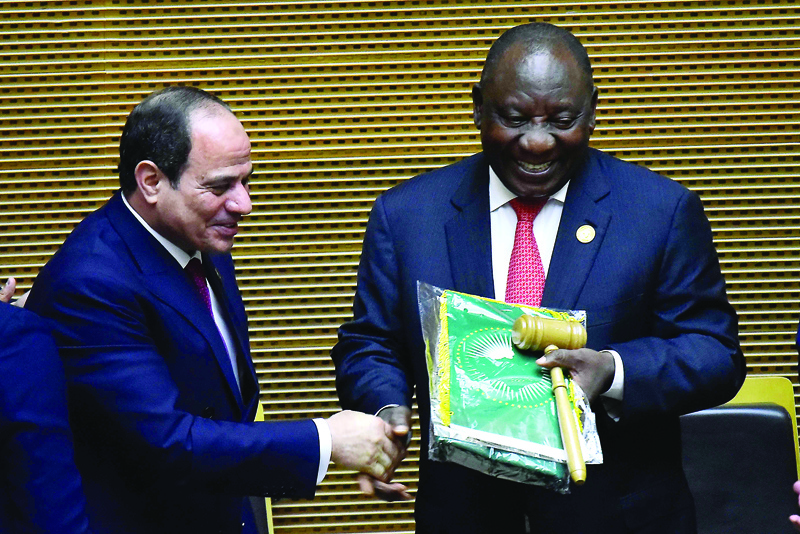
ADDIS ABABA: African leaders yesterday condemned US President Donald Trump's Mideast peace plan as illegitimate, taking advantage of an African Union summit to voice solidarity with "the Palestinian cause". AU Commission Chairman Moussa Faki Mahamat told assembled heads of state that the plan unveiled in late January represented the "umpteenth violation of multiple United Nations and African Union resolutions".
He said that it was prepared without international consultation and that it "trampled on the rights of the Palestinian people", a line that drew applause in the main hall at AU headquarters. Trump's long-delayed peace proposals were immediately rejected by the Palestinians, who have boycotted his administration over its pro-Israel stance. The proposals include giving Israel the green light to annex settlements in the occupied West Bank, the largest part of the territories the Palestinians see as their future state.
The outgoing AU chair, Egyptian President Abdel Fattah Al-Sisi, said in his remarks yesterday that "the Palestinian cause will always be in the hearts and minds of the people of Africa". His successor, South African President Cyril Ramaphosa, compared Trump's proposals to regulations in place during his country's apartheid period. "As I listened to it and as I read everything that's written about it, it brought to mind the horrible history that we in South Africa have gone through," he said.
Palestinian President Mahmoud Abbas, who regularly attends AU summits, did not travel to Ethiopia this year. Palestinian officials said last week that Abbas was heading to the UN to push for a Security Council resolution condemning Trump's peace proposals. The resolution will almost certainly be vetoed by the US. Abbas was represented Sunday by Palestinian Prime Minister Mohammad Shtayyeh, who reiterated Palestinian leaders' position that the Trump plan "has no legitimacy whatsoever".
The annual African Union summit had opened with leaders vowing that the AU would play a more prominent role in resolving conflicts proliferating across the continent. The theme of the two-day summit is "Silencing the Guns". The focus on conflicts marks a departure from multiple years of debate centered on reforming the AU -including its funding structure - and the implementation of a continent-wide free trade area.
In his opening remarks to assembled heads of state yesterday, Faki painted a bleak picture of the continent's security situation, citing "terrorism, intercommunal conflict and pre- and post-election crises". He also noted that while some progress has been made recently in Central African Republic and Sudan, long-running conflicts in places such as Libya and South Sudan have been joined by new crises from Cameroon to Mozambique.
Faki stressed that it would take more than military action to address the "root causes" of African conflicts, namely poverty and social exclusion. He reiterated the AU's determination to find "African solutions to African problems". Yet his remarks came as multiple African leaders were acknowledging the AU's failure to achieve the goal adopted in 2013 of ending "all wars in Africa by 2020".
Libya and South Sudan
Ramaphosa, who is taking over from Sisi as AU chair, announced that he planned to host two summits in May - one focused on conflict resolution and the other on implementation of the African Continental Free Trade Area. "We will focus our efforts on conflict resolution across the African continent, especially those experiencing protracted conflict," he said. Ramaphosa has identified South Sudan and Libya as two conflicts he wants to prioritize.
On Saturday night, in an effort to jumpstart mediation efforts to form a power-sharing government in South Sudan, Ramaphosa met separately with South Sudanese President Salva Kiir and rebel leader Riek Machar. The two men face a Feb 22 deadline to form a government, but they have already missed two previous deadlines to settle their differences. South Sudan's civil war began in 2013 and has left 380,000 people dead and millions more in dire poverty.
On Libya, the AU has consistently complained about being sidelined during peace processes led primarily by the UN. At a summit in Congo-Brazzaville in late January, African leaders vowed to hold a reconciliation forum for Libya's warring parties. UN Secretary General Antonio Guterres endorsed this initiative at a press conference at the AU on Saturday, saying he understood the AU's "frustration" at having "been put aside" when it comes to Libya. In a speech Sunday, Guterres said "a new framework of cooperation" between the AU and the UN had been established for Libya.
Financing
The AU will have to overcome internal disputes and insufficient financing for peacekeeping missions if it wants to become a major player in conflict resolution. In a report published Friday, the International Crisis Group think-tank said the AU should prioritize finalization of an agreement that would see the UN finance 75 percent of peacekeeping missions backed by the UN Security Council.
Guterres mentioned the agreement during his speech yesterday, saying African peacekeeping missions must have adequate and predictable financing. Ramaphosa said the AU's goal of "silencing the guns" underpinned his other ambitions for economic development and combating gender-based violence. Also yesterday, the AU announced that the Democratic Republic of Congo would replace South Africa as AU chair in 2021. - Agencies










